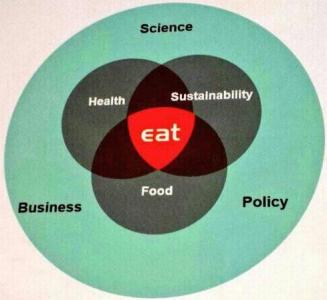The EAT forum was an opportunity to hear from a wide array of world-renowned experts about their work related to sustainability, food and nutrition. From having not attended the first day, I came in fresh faced and full of energy. I got the impression from the first few speakers that the dinner the night before was a late one. The day was full of interesting speakers, all of whom gave good account for their work and their own particular angle that they were pushing.
First an eloquent Dr. Shashi Tharoor, the former Indian Minister of State for Human Resource Development made a case for the need of business to support “innovation, invention and flexibility” in seeking to secure the Indian energy-food-water nexus. He talked about the limitations of democracy when it comes to politicians ability to focus on long-term goals and long-term sustainability, given that to get re-elected they need to achieve short-term results.
Next to get my attention was Jose Zaglul, the President of Earth University in Costa Rica. He described a very interesting programme, which has been run at the Earth University for the last 23 years where all students are required to start and run a business, paying all the legally liable taxes and fees the country requires. Of the profits make, the university withholds 33% and the students can keep the rest. Apart from 23% of all graduates starting their own business they have an employment creation rate of 4 jobs for every 1 graduating student, very impressive.
Kathryn Murdoch, a visiting Fellow from Oxford University was talking about fishing. I was prepared for the usual story about quotas and species decline but, as was common for many presentations throughout the day, she proposed solutions, and successful, field-proven solutions at that. As a response to declining catches she presented a case from the Gulf of Mexico, which made the fishermen shareholders in the red snapper stocks and this way, made them responsible for quality of the catch – she called this ‘rights-based management’.
Following this interesting introduction, Professor Christopher J.L. Murray and Professor Hans Rosling introduced us to the world of statistics, with focus on world health and population growth. Professor Murray presented statistics available to the public on world health problems and changes over time. He illustrated trends of public health threats the past decades, in different categories. For example the importance of cardiovascular diseases, as one of the most prominent health threat, is increasing in relation to infectious diseases. This trend can be related to the increase in per capita intake of meat and animal products. For example, when calculating for a minimum risk diet, only meat and whole grain is produced in excess, thus indicating a large over-intake of these items. However, in large parts of the world there is still a daily hunt for protein, and where livestock sourced foods are key for securing food safety.
Hans Rosling made a strong and important point in highlighting the huge knowledge gap in the developed world, regarding the expected population growth, education status of men and women. He pressed the point of the danger in not knowing our statistics properly, thus concluding “How can you talk about the future when you don’t know your present?”
Diets were next on the agenda. According to Prof. Brian Wansink, his project with Cornell University showed that price subsidies are not the only option for promoting healthier diets. Placing fruits in a nice bowl in a well-lit place increased fresh fruit consumption by 140% in US schools. Simply making them harder to physically take from the food line, and promoting healthier food options with more suitable location and more attractive names can reduce consumption of ‘bad’ foods. When these children were asked why they made a healthy choice, their response was, “I don’t know why” – and in one single moment the solution to making kids eat healthier was solved!
 The soon to be famous double triple helix of EAT 2014.
The soon to be famous double triple helix of EAT 2014.
Dyborn Chibonga continued day 2 of the EAT forum brining up some very important points to the somewhat male-dominated crowd, with a majority of delegates representing the developed world. First, smallholders should not be the beneficiaries of programmes and initiatives for rural development; they should be the implementers and contributors of them. Thus, they should be included in the beginning of the process of developing an initiative, not at the end when all the important decisions have already been made. Secondly, he also stressed the fact that we need to better empower women who make up 60-80 % of smallholders, however only own 2 % of the farmed land resources.
Finally an old friend of SIANI, Vandana Shiva came on stage as part of an all-female panel looking at “Who are the new change-makers?” I won’t make any comments on gender mainstreaming here but 2 all-male and one all-female panel isn’t it. One can also ask why panels are divided in gender and not mixed for a more open discussion? Vandana cut through a lot of the talk on business and investment, characterizing the ‘100 year old mechanistic view’ that most politicians and policy makers hold on to. She called for more biodiverse and ecological innovation and for a drive to move away from yield per hectare and to think about ‘health per acre’. She said that a world full of 9 billion should be a wonderful place, and indeed the Earth could support up to 14 billion people if agro-ecological thought was mainstreamed. The interesting session with many strong voices also brought up important issues, such as empowering women, and also educating men to open space for women to move into, and to challenge the large producers to produce food sustainably, and take responsibility of both social, ecological and economic issues.
In summary it was a very interesting day, much more stimulating than the usual conference and filled with many coffee break and lunchtime chats with interesting people. It looks like EAT will continue to go from strength to strength and will return with a much-improved mandate in 2015. David Nabarro emphasized the vital role of communications for making food healthier and improving food production. “The EAT forum has the potential to be transformational and can become an important actor in the development towards sustainable food production as a catalyst for change”.
For me, the main take home message was offered by Nordic Choice Hotels themselves. They gave the results of an internal study where reducing the size of plates in their breakfast buffet from 24 to 21cm reduced their food waste by 20% and made a double saving as they needed to purchase less food and pay to dispose of less waste. The message – make bad food choices harder. However is that something food companies will listen to, I’m not so sure. And as far as I could tell, the late dinner the night before didn’t impact proceedings so much.
Read another blog form the same event: CSR is Dead, Long Live the Triple Bottom Line!
Matthew Fielding, Project Manager at SIANI. Matthew has worked as a field researcher for 6 years in the Amazon region of South America and in Western Africa. His focus has been on interactions between agricultural practice, soil health and livelihoods. He has wide interests linked to these areas in emerging technologies such as biochar and remote sensing and especially their potential in rural capacity development. Matthew has an MSc in Development Studies from the School of Oriental and African Studies (SOAS) in London and a BSc in Tropical Environmental Science from the University of Aberdeen. He is a fellow of the Royal Geographical Society.
